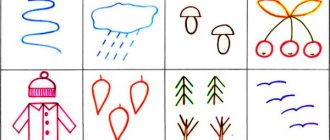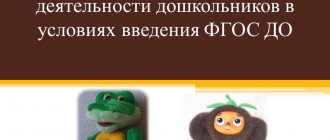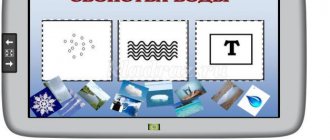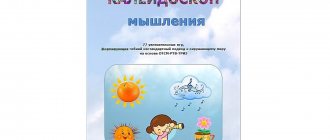MAGAZINE Preschooler.RF
DESIGNING CULTURAL PRACTICES OF PRESCHOOL CHILDREN IN THE EDUCATIONAL PROCESS OF KINDERGARTENA characteristic feature of our time is the strengthening of the cultural foundations of education. As emphasized in the works of T.B. Alekseeva, E.V. Bondarevskaya, N.F. Golovanova, N.B. Krylova, modern education is focused on the most complete cultural development of a person capable of spiritual and physical self-development, self-improvement and self-realization in society.
It is important that in preschool childhood each child acquires the necessary cultural personal experience, which is the foundation of full overall development, positive socialization and individualization.
It should be noted that the concept of “cultural practices in the educational process” is quite new for domestic pedagogy and education, but has been very actively discussed recently at different educational levels.
The new content of education is focused on the development of universal cultural skills. Such skills begin to be formed during preschool childhood, and then are “finished” and improved throughout subsequent life. They indicate the child’s readiness and ability to act in the circumstances of life and activity on the basis of cultural norms and express:
- content, quality and direction of his actions and actions;
- individual characteristics (originality and uniqueness) of his actions;
- accepting and mastering the cultural norms of the community to which the child belongs;
- acceptance of universally significant (universal) cultural patterns of activity and behavior.
Designing a modern educational process in kindergarten in accordance with the Federal State Educational Standard for Preschool Education aims teachers at the widespread use of cultural practices of preschoolers. Cultural practices become an important structural unit of the educational process in kindergarten.
The child’s cultural practices cover different areas of activity of preschoolers in the educational process of kindergarten. According to N.B. Krylova, cultural practices include the whole variety of socially-oriented, organizational-communicative, research, practical, artistic methods of action that a preschooler undertakes in his experience independently or with the support of a teacher and interaction with him. The design of cultural practices in the educational process proceeds in two directions.
Cultural practices based on the initiatives of children themselves. This is an independent children's activity that occurs both individually and in the process of cooperation with peers. In this case, children's activity is aimed at independent knowledge of the environment, searching for answers to questions that have arisen, reproducing methods of action and testing cultural patterns, norms, creative implementation of plans, observation, research of objects that interest the child, individual and joint play with peers, artistic, constructive activities and etc.
Three to four hours a day are allocated for independent activities of children during the daily routine (depending on the age of the children).
Cultural practices initiated, organized and directed by adults. These cultural practices are directed by the teacher towards the development of independent communicative, research, creative and social activity of preschool children and are based on the support of children's initiatives and interests. Cultural practices are designed by the teacher in accordance with the educational tasks to be solved. The choice of cultural practices is directly related to the content of complex thematic planning of the educational process and is aimed at enriching the cultural experience, independence of behavior and activity, feelings and positive socialization and individualization of preschool children.
When designing them, it is important for the teacher to answer the following questions:
- To what extent do the initiated cultural practices allow one to solve the set educational tasks?
- What activity skills do children master?
- What creative skills do children learn?
- What methods of communication and cooperation do children learn?
- What feelings and emotions do children develop?
- Do children develop independence and initiative?
Complex thematic planning allows you to organically combine cultural practices initiated by the teacher and free cultural practices initiated by children. The value of thematic planning lies in the possibility of integrating different educational content, activating the cognitive and practical experience of children, uniting children in exciting joint gaming, cognitive-research, artistic and practical activities.
For example, to develop children's initiative and creativity, the teacher spends certain days in an unusual way, within the framework of a single theme: “Space Travel Day” , “Magic Transformations Day” , “Health Day” , etc. On such days there are different types of activities and routine processes are organized in accordance with the chosen single thematic plan and accepted roles: “cosmonauts” prepare the spacecraft and equipment, eat space breakfast, go on a journey to an unfamiliar planet, solve mysterious signs and drawings of aliens, draw space landscapes and scenes, make from improvised materials (boxes, plastic tubes, etc.) robots, experiment with water and magnets, listen to space music, poems, riddles about space, etc. During space travel, children take care of each other, provide assistance in case of danger, learn to communicate with aliens. With this organization of the educational process, there is an organic combination of cultural practices initiated by the teacher and children.
The design of cultural practices places special demands on the content and organization of the educational process, the interaction of adults and children, and the design of a subject-development environment. They can be realized through the event-creative orientation of the life activity of preschool children in kindergarten and the teacher’s choice of tactics for pedagogical support of the child, taking into account the characteristics and problems of his individual development.
The event-based development scenario of preschoolers in kindergarten must be built as a system for children to actively solve various, gradually more complex, problematic tasks and situations that meet the children’s actual needs and interests, encouraging preschoolers to demonstrate independence, cognitive and communicative activity, and creativity. This requires the use of personality-oriented pedagogical technologies for the development of a child’s cultural experience at different stages of preschool childhood and the creation of an effectively functioning community of children and adults.
A problematic approach to a child’s cultural practices shows that the most appropriate way to organize them is project-based. Children's interests can serve as the starting point for project activities. Project topics, depending on children’s interests and development goals, touch on different spheres of reality and cultural practices. For example, the projects “Green Pharmacy” , “Vitaminia Country” , “The ABC of Health” have a valeological direction and orient children towards cultural practices of health conservation. The projects “My Family” , “Book of Friends” , “It’s Fun to Walk Together” are related to the social and moral development of children and cultural practices of communication, friendly interaction and humanistically oriented activities. The projects “The Magical World of Nature” , “Mysteries of Water” , “My Favorite Pets” are related to the knowledge of nature and cultural practices of educational and research activities. Literary and artistic direction and corresponding cultural practices prevail in the projects “My Favorite Fairy Tale” , “Literary Basket” , “Book Week” .
At the same time, it should be especially emphasized that, regardless of the leading topic, in every joint project there is an integration of children's experience. Opportunities open up for children to engage in cultural practices of learning, co-creation, cooperation, communication, emotional exchange and mutual support. This reveals the integrative essence of cultural practices.
The results of children's activities, depending on the theme of the project, can be presented in the form of an exhibition of children's works, various crafts, layouts, travel maps, board games, drawings, photo albums, emblems, children's writings (poems, fairy tales, riddles), concerts, theatrical performances , homemade books, etc. In each project, the presentation of the results is organized taking into account children's suggestions and initiatives, so that children have a feeling of satisfaction from interesting joint activities, the joy of cooperation, creativity, mutual support, and a feeling of a single, friendly family is created.
Cultural practices initiated by the teacher involve saturating children's lives with a variety of cultural events, which open up new facets of activity and new content of life for preschoolers. Children cannot find and organize these cultural events on their own. These include thematic children's holidays designed by teachers, including ethnic folk ones, fairs and galleries-exhibitions of children's works, festivals, sports Olympiads and scholarly competitions, children's theatrical studios, workshops, museums, organization of cultural leisure, etc. This is also the participation of preschoolers in the traditions of the kindergarten: celebrating the birthday of the kindergarten and age group, congratulating teachers and staff, the children's theater festival, the “Farewell to Winter” , “Bird Day” holidays, the alumni holiday “Goodbye, Kindergarten” , etc. The participation of preschoolers in exciting cultural events initiated by educators does not pass without a trace. Children begin to actively reproduce them in their independent activities, primarily in games, adding their imagination and new details.
Cultural practices are a natural part of a child's daily life. The process of mastering cultural practices is associated with the child’s ability to independently and actively realize his interests, plans, and make free choice in the educational environment. The condition for the implementation of cultural practices is the freedom of the preschooler to choose the means of realizing his activity. A prerequisite for the realization of freedom is psychological readiness to make a choice. An urgent pedagogical task is to provide opportunities for each child to make independent choices and “discover themselves” in various types of activities.
It is important to carefully study the content of children’s everyday experience, children’s subculture from the perspective of cultural practices mastered within their framework, and provide children with appropriate pedagogical support. The teacher’s task is to promptly contribute to the enrichment of independent, proactive, creative children’s activities, to support children’s plans, and to help spread successful individual cultural practices among children. It is important to enhance mechanisms for the exchange of ideas and mutual learning.
In conclusion, I would like to emphasize that cultural practices play an important role in the positive socialization and individualization of preschool children. They activate mechanisms of self-development, initiative and freedom of expression. The task of expanding the space of children’s cultural practices in educational and independent activities does not lose its relevance and requires further development.
| Next > |
Designing a modern educational process in kindergarten in accordance with the Federal State Educational Standard for Preschool Education aims teachers at the widespread use of cultural practices of preschoolers. Cultural practices become an important structural unit of the educational process in kindergarten.
Federal State Educational Standard for preschool education:
clause 2.11.2. “The content section of the Program should present the features of educational activities of different types and cultural practices.”
From the point of view of N.B. Krylova, the cultural practices of a preschooler are the usual (habitual, everyday) ways of independent activity for a child of this age, as well as testing (constant and isolated trials) of new methods and forms of activity (i.e. creativity) and behavior in order to satisfy various needs and interests.
Cultural practices are situational, autonomous, independent, initiated by an adult or the child himself, the acquisition and repetition of various experiences of communication and interaction with people in various situations, teams, communities and social structures with adults, peers and younger children. It is also the development of positive life experiences of empathy, goodwill and love, friendship, help, care, altruism, as well as negative experiences of dissatisfaction, resentment, jealousy, protest, and rudeness.
The child’s cultural practices cover different areas of activity of preschoolers in the educational process of kindergarten. According to N.B. Krylova, cultural practices include the whole variety of socially-oriented, organizational-communicative, research, practical, artistic methods of action that a preschooler undertakes in his experience independently or with the support of a teacher and interaction with him. The design of cultural practices in the educational process proceeds in two directions: Cultural practices based on the initiatives of the children themselves, Cultural practices initiated, organized and directed by adults.
Cultural practices based on the initiatives of children themselves are independent children's activities that take place both individually and in the process of cooperation with peers.
Cultural practices initiated, organized and directed by adults are directed by the educator to the development of independent communicative, research, creative and social activity of preschoolers and are based on the support of children's initiatives and interests.
When organizing the educational process, there is an organic combination of cultural practices initiated by the teacher and children. They can be realized through the event-creative orientation of the life activity of preschool children in kindergarten and the teacher’s choice of tactics for pedagogical support of the child, taking into account the characteristics and problems of his individual development.
Cultural practices initiated by the teacher involve saturating children's lives with a variety of cultural events, which open up new facets of activity and new content of life for preschoolers. Children cannot find and organize these cultural events on their own. These include thematic children's holidays designed by teachers, including ethnic folk ones, fairs and galleries-exhibitions of children's works, festivals, sports Olympiads and scholarly competitions, children's theatrical studios, workshops, museums, organization of cultural leisure, etc. This is also the participation of preschoolers in the traditions of the kindergarten: celebrating the birthday of the kindergarten and age group, congratulating teachers and staff, the children's theater festival, the "Farewell to Winter" holidays, "Bird Day", the alumni holiday "Goodbye, Kindergarten", etc. The participation of preschoolers in exciting cultural events initiated by educators does not pass without a trace. Children begin to actively reproduce them in their independent activities, primarily in games, adding their imagination and new details.
The condition for the implementation of cultural practices is the freedom of the preschooler to choose the means of realizing his activity. A prerequisite for the realization of freedom is psychological readiness to make a choice. An urgent pedagogical task is to provide opportunities for each child to make independent choices and “discover themselves” in various types of activities. In conditions of choice, the subjective manifestations of children are most actively expressed.
Cultural practices mastered by preschoolers include:
- game (plot and with rules),
- productive activity
- educational and research activities (experiments, collecting, traveling on the map)
- reading fiction,
- practical activities (labor education)
- effective physical exercises (“physical education”)
- communication training (speech development)
- playing music
- collecting,
- independent research and experimentation,
- mumming and theatrical performances, travel games,
- joint construction of various objects, etc.
In cultural practices organized by the teacher, an atmosphere of freedom of choice, creative exchange and self-expression, and cooperation between adults and children is created. The organization of cultural practices is predominantly subgroup in nature.
The child’s cultural practices serve as a core that allows him to build and comprehend the content and forms of his life activity, including:
- experience of independent creative action, one’s own diverse activity based on one’s own choice;
- situational and in-depth communication, fruitful communication and interaction (collaboration) with adults and children;
- emotions and feelings, attitude towards oneself and other people;
- the sphere of one’s own will, desires and interests;
- your selfhood, which can be defined as self-awareness, understanding of your “I” as a diverse self-existence;
- independence and autonomy, responsibility and dependence, giving the child the right to choose and ensuring self-determination.
Preschool childhood is a special cultural world, with its own boundaries, values, language, way of feeling, thinking, and acting. The cultural practices of a preschooler are inextricably linked with his interests, needs (vital, communicative, activity, play, etc.) and ways of self-expression. The process of preschool education is aimed at enriching the individual resources of the child’s personal development with cultural means.
Literature:
Babaeva T.I., Solntseva O.V. Scientific and methodological journal “Kindergarten: theory and practice”. No. 5, 2015 pp. 38 - 47
Krylova N.B. Cultural practices of childhood and their role in the formation of the child’s cultural idea // Originality of childhood. M., 2007. pp. 79-102. (New values of education. Issue 3 (33)).




